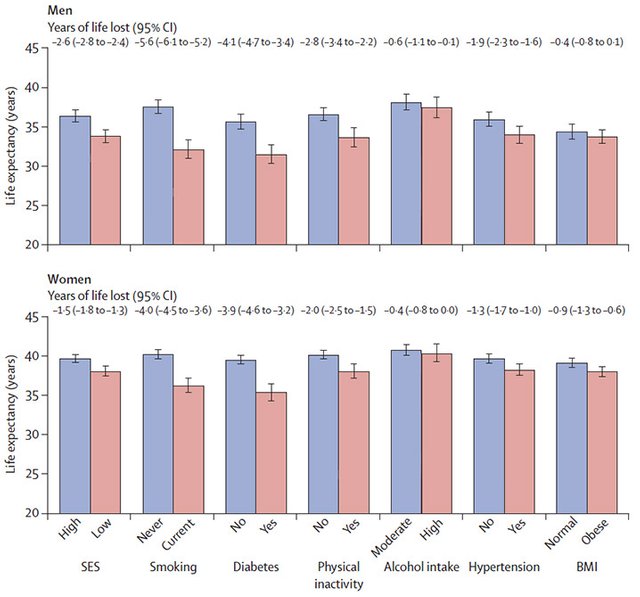Low Socioeconomic Status Linked to Premature Mortality
Being poor can hurt you in more ways than just your wallet, but also your health. Low socioeconomic status has been linked to a reduced life expectancy as a major factor for ill health and early death.

source
This has been shown in a recent study published in the journal Lancet involving over 20 researchers from all over the world. The study took data from 48 studies involving 1.7 million people from UK, France, Switzerland, Portugal, Italy, USA and Australia. A person's job title was used to estimate their income and socioeconomic status which was correlated to whether they died earlier not.
A senior author of the study, Prof. Paolo Vineis, said:
"Socioeconomic status is important because it is a summary measure of lifetime exposures to hazardous circumstances and behaviors, that goes beyond the risk factors for non-communicable diseases that policies usually address"
The study was part of an effort to meet the 25x25 initiative established by the World Health Organization in its Global Action Plan for the Prevention and Control of Non-Communicable Diseases. The plan is to cut mortality from non-communicable diseases by 25% by 2025. Previous studies did not include socioeconomic factors in noncommunicable diseases. This study looked at the contribution that a low socioeconomic status plays in mortality and years of life lost, compared to other 25x25 risk factors such as physical inactivity, smoking, diabetes, high blood pressure, obesity and high alcohol intake.

Life expectancy from age 40 years to 85 years and years of life lost due to low socioeconomic status and 25 × 25 risk factors
Those of lower socioeconomic status were 1.5 times (or 46%) more likely to die before they were 85 years old compared to wealthier people.
It's also estimated that 41% of men and 27% of women are in the low socioeconomic status, and this correlates to a reduction in life expectancy of 2.1 years, which is close to the life reduction from being inactive at 2.4 years shorter lifespan.
The greatest risk factor was for those who smoke or have diabetes, at 4.8 and 3.9 years lost for each. But socioeconomic status does reduce life expectancy more than blood pressure at 1.6, obesity at 0.7, and high alcohol consumption and 0.5 years gone.
The accuracy might not be perfect, as previously mentioned the socioeconomic status was determined by the occupation the person currently had in order to determine their life expectancy. This can oversimplify the complexity that socioeconomic status actually has. Someone might have a low socioeconomic status but still maintain a high enough level of health despite such circumstances.
Separating the effects of low socioeconomic status from other risk factors is difficult. Including it with other factors might make for a better assessment of how it plays a part either individually to affect life expectancy, or if it's more related to the increase in influence of other factors in someone's life. The degree of poverty might correlate with smoking and poor eating to develop diabetes, and also low physical activity that can lead to other health issues, such as blood pressure and being overweight, and also affect the increase in consumption of alcohol.
Dr. Silvia Stringhini, the lead author of the study highlights the importance of this information:
"Reducing poverty, improving education and creating safe home, school and work environments are central to overcoming the impact of socioeconomic deprivation. By doing this, socioeconomic status could be targeted and improved, leading to better wealth and health for many."
References:
- Low socioeconomic status reduces life expectancy and should be counted as a major risk factor in health policy, study says
- Dr Silvia Stringhini et al. Socioeconomic status and the 25 × 25 risk factors as determinants of premature mortality: a multicohort study and meta-analysis of 1·7 million men and women. The Lancet, January 2017 DOI: 10.1016/S0140-6736(16)32380-7
Thank you for your time and attention! I appreciate the knowledge reaching more people. Take care. Peace.
If you appreciate and value the content, please consider:
Upvoting  , Sharing
, Sharing  or Reblogging
or Reblogging  below.
below.
Please also consider supporting me as a Steem Witness by voting for me at the bottom of the Witness page; or just click on the upvote button if I am in the top 50:


@krnel
2017-02-10, 5:09pm

@KrNel, your post has been chosen by @STEEMNEWS.ONLINE as one of today's promoted posts for its excellent content. We've upvoted, resteemed and published it through Facebook & Twitter.
As the author of a SNO featured article, you've been awarded one TRAIL coin. Please stop by the SteemTrail Discord server to learn more about how to claim your TRAIL coin. You will need an Open Ledger account to do so.
STEEMNEWS.ONLINE is the @SteemTrail for #news and watches the #steemnews tag most closely. Please consider supporting excellent news articles by making steemnews.online one of your operators on Streemian, in addition to steemtrail.
Thank you for your hard work and contribution of excellent content to Steemit.

If you would rather not be promoted by STEEMNEWS.ONLINE, please inform us by replying to this comment and we will honor your request.
Interesting topic, and study. I find myself scratching my head a bit, trying to determine exactly "what" we are looking at, here. What I mean is... how to separate causal from non-causal correlations. I'm also not too sure about the metrics... "job title?"
I don't doubt that it is stressful to live in poverty and constantly be worried about whether the gas or electricity will be cut off next month... and stress is definitely an asskicker, health-wise. On the other hand, I am statistically "poor" AND technically speaking "unemployed," yet my alt-independent lifestyle is chosen and doesn't feel like hardship.
Another thought here is also the value of a "safety net" for those who are financially insecure... that varies from country to country; in places like Scandinavia, there's a social system in place to catch you if something bad happens... here in the US (for example) it could mean living in a refrigerator box under an overpass.
Thought provoking content, as always!
Indeed. That's why I added "Someone might have a low socioeconomic status but still maintain a high enough level of health despite such circumstances." I am included in that :P hehe. Maybe I'm not healthy, but having little money isn't the determining factor. Thanks for the feedback as usual :)
High mortality is normally concentrated in deprived areas in several countries. The actual economy in the post-scarcity era shows the attack of liberalism on welfare to generate low wages and increasing poverty.
I'm going to put here a part of a Speech about poverty written by Mumia Abu-Jamal , a very sharp economist in jail for 25 years.
"Back in 1958, an economist noted that when unemployment rises, wages fall (this is known as the "Phillips Curve"). This is so because when most workers are employed, business is pressed to react to wage demands.
However, when there is significant unemployment, business knows they can find labor at lower wages. Thus, unemployment drives down wages for all workers, as it increases job security. What does this have to do with welfare?
Well, welfare is a form of income maintenance, and as such, it served as a buffer between the employed and the unemployed.
Therefore, workers were not desperate for any job that they could find. When workers are not desperate, when they have security, they demand higher wages form capital. Who would've thought that the poorest among us, those on welfare, strengthened and stabilized the wages of workers?
It's for this reason that capital launched it's attack on income maintenance programs through its political agents (republicans and democrats), using the slight-of-hand label of "welfare reform." "
They want to keep folks stressed out running at full steam in the rat's wheel right into their graves. I so look forward to the day when money is obsolete.
Class Warfare doesn't exist @orenshani7
https://steemit.com/economy/@orenshani7/let-s-talk-about-the-rothschilds-20161115t71325295z
You consistently and frequently present important information in a clear format. Thanks @krnel.
Welcome ;)
i like it.
amazing post @krnel